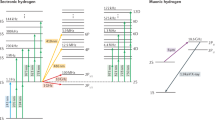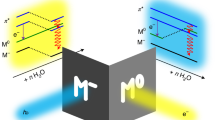Abstract
SIR OLIVER LODGE'S interesting speculation, in NATURE of November 25, p. 696, as to the possible similarity of positive and negative electrons suggests an inquiry into the relative abundance of the lighter and heavier elements to be expected on this hypothesis. Considering the simplest case, that of hydrogen, let us assume that very large equal numbers of positive and negative electrons initially combine to form N + n positive, and N – n negative protons, and that the negatives immediately combine with an equal number of positives to form heavier nuclei, leaving 2n positive protons to form hydrogen atoms. Since in the combination of protons to form heavy nuclei the loss of mass by “packing” is apparently small, the ratio mass of hydrogen/total mass of all elements should be very nearly equal to 2n/2N, i.e. n/N.
This is a preview of subscription content, access via your institution
Access options
Subscribe to this journal
Receive 51 print issues and online access
$199.00 per year
only $3.90 per issue
Buy this article
- Purchase on Springer Link
- Instant access to full article PDF
Prices may be subject to local taxes which are calculated during checkout
Similar content being viewed by others
Author information
Authors and Affiliations
Rights and permissions
About this article
Cite this article
POOLE, H. Speculation concerning the Positive Electron. Nature 111, 15–16 (1923). https://doi.org/10.1038/111015c0
Issue Date:
DOI: https://doi.org/10.1038/111015c0
This article is cited by
-
A terminological history of early elementary particle physics
Archive for History of Exact Sciences (2023)
Comments
By submitting a comment you agree to abide by our Terms and Community Guidelines. If you find something abusive or that does not comply with our terms or guidelines please flag it as inappropriate.



